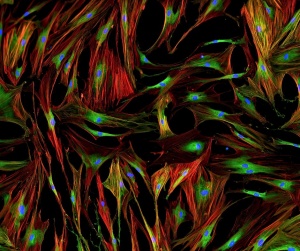Objectives
This 5-day course offers to the participants a light microscopy course focusing on fluorescence microscopy techniques applied to the detection of proteins and glycans in tissue samples and cell cultures. Proteins are a direct product of genes, while glycan synthesis does not require a template. Together proteins and glycans are key elements that contribute to the cellular and organismal diversity and provide the substrate for evolution. The course integrates theoretical lectures (~50%) with hands-on experiments, practical experience at the microscope and image analysis sessions (~50%), focused on cell biological studies.
The teaching staff consists of biologists that use fluorescence microscopy in their research work. Participants are encouraged to discuss their specific problems during the course.
The specific objectives are:
- To give a general overview on light microscopy with a focus on fluorescence microscopy;
- To present the most useful techniques to detect proteins and glycans using fluorescence microscopy;
- To provide basic knowledge on digital image processing and analysis.
Topics:
- Light, optics and microscopy
- Fluorescence, spectra and filters
- Microscopy hardware: Lasers, lamps and detectors
- Dyes and Fluorophores
- Antibodies and Lectins
- Sample preparation and incubation
- Concept of colocalization and image acquisition
- Image processing and analysis using ImageJ
Participants have to be present at 85% of the contact hours (this means that they can miss one half-day), and actively participate in all activities.
This course can give credits to PhD programmes at FCUL or of programmes with partnership from FCUL and other institutions with 6h-7h of contact hours per ECT, as a function of specific requirements. For these students additionally to the exercises done during the week the delivery of a written report done after the course is mandatory. For programmes with less hours of contact per ECT (6h/ECT, getting 6 ECTs from the course) students need to do an additional assignment (summary report). If needed 1 or 2 additional hours of contact may be added. Such report(s) are also advised for other students requesting accreditation of the course in their institutions.
Minimum formation: Basic notions of cell and molecular biology.
Directed to: MSc or PhD students in Biology, Biochemistry, Biotechnology, Biomedical Sciences or related areas, postdocs and professionals working in related topics
General Plan
MONDAY
09:00-09:30 Welcome session and program presentation
09:30-12:30 Lectures: (i) Light, optics and microscopy; (ii) Fluorescence, spectra and filters; (iii) Microscopy hardware: Lasers, lamps and detectors; Trainer: Luís Marques
12:30-13:30 Lunch
13:30-17:30 Visit to the Microscopy facility + Participants work presentation; Trainer: Luís Marques
TUESDAY
09:00-12:30 Lectures: (iv) Dyes and Fluorophores; (v) Antibodies and Lectins; (vi) Sample preparation and incubation; Trainers: Ana Rita Carlos and Romana Santos
12:30-13:30 Lunch
13:30-17:30 Practical session: Sample Fixation, Embedding, Paraffin and Cryostat sectioning; Trainers: Ana Rita Carlos, Luís Marques and Romana Santos
WEDNESDAY
9:00-12:30 Practical session: Immunohistochemistry in cell cultures; Trainers: Ana Rita Carlos and Romana Santos
12:30-13:30 Lunch
13:30-17:30 Practical session: Immunohistochemistry in cell cultures; Trainers: Ana Rita Carlos and Romana Santos
THURSDAY
9:00-12:30 Practical session: Lectin histochemistry in paraffin sections; Trainers: Ana Rita Carlos and Romana Santos
12:30-13:30 Lunch
13:30-17:30 Practical session: Lectin histochemistry in paraffin sections; Trainers: Ana Rita Carlos and Romana Santos
FRIDAY
9:00-10:30 Lecture: (vii) Colocalization and image acquisition
10:30-12:30 Practical session: Image acquisition with the fluorescence microscope
12:30-13:30 Lunch
13:30-17:30 Tutorial Computer session: Image processing and analysis using ImageJ; Trainer: Luís Marques
Funding
Students fees
Partners
n.a.
Fee
Free for 1st year PhD students in Doctoral programmes at FCUL (e.g. Biologia), Biodiversity, Genetics and Evolution (BIODIV UL; UP), Biology and Ecology of Global Changes (BEAG UL, UA) and Sustainability Science (UL, several institutions), when the course counts credits for their formation, in which case the delivery of a final report done after the course is mandatory; the course is also free for more advanced PhD students of the BIODIV programme (ULisboa or UPorto); 50 € for more advanced PhD students of cE3c of other programmes; 80 € for PhD students of the PEERS network (CFE); 125 € for FCUL Master students and unemployed; 180 € for BTI, BI and other PhD students; 250 € for Professional and postdocs.
When the maximum number of students is reached, 10 vacancies will be available for non-paying 1st year PhD students mentioned above, being, by order of preference students from: 1) cE3c; 2) BIODIV (not from cE3c); 3) FCUL (not from cE3c); 4) Sustainability Science (not from cE3c or FCUL); 5) BEAG (not from cE3c or FCUL).
Candidates should fill in the following FORMULARY:
CLOSED
This formulary is strictly confidential, as explained in the introduction, and the data are required because the cE3c Advanced Courses are also offered as part of the PRR programme of FCUL.
When filling the formulary mind to:
- FILL ALL THE MANDATORY FIELDS
- UPLOAD CV AND MOTIVATION LETTER, both mandatory; use the names as instructed there
- If you want to resume later SAVE the formulary, otherwise you will need to fill everything again
- At the end SUBMIT the formulary before exiting
For any doubts please contact the cE3c coordinator of the cE3c courses Margarida Matos (mmmatos@fc.ul.pt) and Ana Rita Carlos (arcarlos@fc.ul.pt) or Romana Santos (rlasantos@fc.ul.pt).
arcarlos@fc.ul.pt

